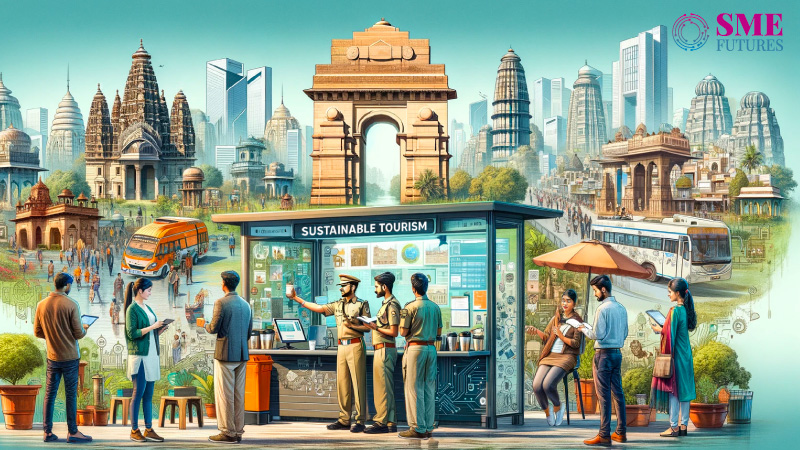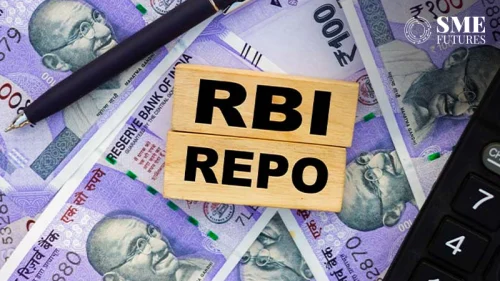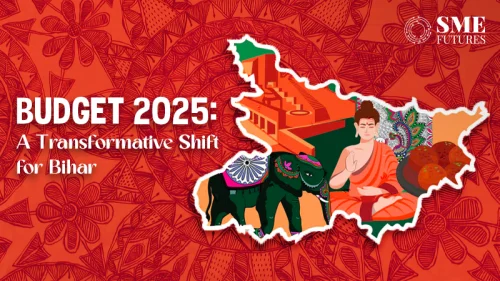‘Take nothing but pictures, leave nothing but footprints, kill nothing but time.’
In a world where every journey leaves its imprint, sustainable tourism has emerged as a guiding light towards a more balanced and mindful exploration of spaces. As the world navigates towards a more conscious era of travel, the corridors of sustainable tourism beckon us to tread a path that harmonises exploration with preservation.
From the bustling streets of tourist hubs to the serene landscapes off the beaten path, the tourism industry faces challenges galore.
The road to sustainable tourism is not without hurdles. Tourism overload, carbon emissions, and waste management remain pressing issues. Yet, businesses embracing sustainability have shown a 25% reduction in emissions, showcasing the real impact of eco-friendly practices.

Role of technology in promoting sustainable tourism

“Virtual reality (VR) and augmented reality (AR) have the potential to revolutionise the tourism industry and the way we experience travel,” says Sandeep Arora, Director, Brightsun Travel, India.
These cutting-edge technologies not only offer immersive travel experiences but also contribute to reducing the carbon footprint associated with physical travel. By embracing AR-based ‘second life tourism,’ where virtual experiences mimic real-world destinations, tourists can enjoy cultural exploration without adding to tourism overload and environmental degradation. Furthermore, VR and AR serve as powerful educational tools, enlightening travellers about environmental conservation and sustainability efforts.
Arora’s insights are corroborated by recent statistics from the KPMG report on Sustainability in Tourism, which reveals that 75% of travellers believe that immersive experiences through technologies like AR and VR can enhance their understanding of local cultures and environmental challenges. This underscores the growing importance of technology-driven solutions in promoting sustainable or eco-tourism practices.
In addition to VR and AR, the use of blockchain technology is gaining traction in the tourism sector for enhancing transparency and accountability. According to a recent study by Sustainable Tourism International, 60% of tour operators are considering or actively implementing blockchain solutions to track and verify sustainability claims, ensuring that eco-friendly practices are genuinely implemented across the tourism value chain.
Challenges and solutions in sustainable tourism adoption

Jessica Matthias, Global Sustainability Director, Sabre, highlights the key challenges faced by the tourism industry in adopting sustainable practices. Even though the spectres of over tourism, carbon emissions, and waste management loom large, through a concerted effort- involving regulations, policies, and community engagement- these challenges can be effectively addressed.
“Implementing sustainable tourism practices, such as limiting visitor numbers, protecting natural and cultural heritage sites, and promoting waste management systems is essential. Governments play a pivotal role in incentivising and promoting such initiatives, fostering a culture of responsible tourism at both local and national levels,” she says.

According to the KPMG report, 60% of travellers consider sustainability a significant factor in their travel decisions. This shift in consumer behaviour underscores the need for the tourism industry to prioritise sustainability initiatives.
Furthermore, the World Travel & Tourism Council (WTTC) reports that the tourism sector is responsible for 8% of global greenhouse gas emissions. However, initiatives like the Sustainable Tourism Stewardship Council, which certifies businesses for sustainable practices, have shown a 25% reduction in emissions among certified entities. This demonstrates the tangible impact of adopting sustainable practices in the tourism sector.
Empowering tourists for sustainable travel
Puneet Sharma, founder of Zoop, emphasises, “To promote sustainable tourism, it’s important for tourists to make conscious choices when deciding where to travel.”
“Opting for offbeat destinations, engaging in nature-centric activities like cycling or hiking, minimising plastic usage, and supporting local economies are practical steps that tourists can take to minimise their environmental impact,” he elaborates.
In addition to individual choices, collective initiatives such as carbon offsetting programmes are gaining popularity. The International Air Transport Association (IATA) reports that airlines participating in carbon offsetting programmes have collectively offset over 10 million tons of CO2 emissions since the inception of such initiatives, highlighting the potential for collaborative efforts in mitigating the environmental impact of travel.
Emerging trends and future outlook

Looking ahead, the future of sustainable tourism is filled with promising trends. Regenerative travel, digital innovation, and sustainable transportation are gaining traction. Regenerative travel, in particular, seeks to have a positive impact on destinations visited, going beyond mere sustainability. This approach aims to restore and rejuvenate the environment and communities affected by tourism, creating a mutually beneficial relationship between travellers and the places they visit.
Technology-driven solutions, such as route optimisation for reduced emissions and transparent sustainability information for travellers, are reshaping the industry. Collaboration across stakeholders, as seen in initiatives like Travalyst, indicates a collective commitment to mainstreaming sustainable travel practices.
“Sustainability is now a hygiene factor and not a differentiating factor. Water recycling, rainwater harvesting, and garbage segregation are all mandatory and standard. These anyway need to be done by even commercial organisations, households and societies, not just hotels. Hotels will need to focus on community engagement, social awareness, skilling and jobs for the next generation to keep them future ready,” says Dr. Vikram Kamat, Founder and CMD, The Vitskamats Group.

The Sustainable Tourism Report by KPMG further highlights emerging trends in the industry, with a notable increase in eco-friendly accommodations and activities. Sustainable transportation options, such as electric vehicles and biking tours, are becoming more accessible, contributing to a greener travel experience.
Moreover, partnerships between government agencies, private enterprises, and NGOs are fostering innovation and driving sustainable tourism initiatives forward.
Why public participation is imperative
In the quest for sustainable tourism, individual actions play a pivotal role. By making conscious choices and advocating for responsible travel practices, tourists can contribute significantly to preserving fragile ecosystems and cultural heritage sites. Opting for offbeat destinations, minimising plastic usage, supporting local economies, and participating in carbon offsetting programmes are practical steps individuals can take to minimise their environmental impact.
Mount Everest, once revered as the pinnacle of natural beauty and majesty, is now marred by extreme pollution caused by mountaineers and skiers. Overcrowding, long queues, and significant waste generation, averaging eight kilograms per climber, have degraded the environment and contaminated the local watershed. Despite efforts by authorities and NGOs, urgent collective action is needed to preserve Everest’s pristine environment.
If we don’t switch to eco-tourism methods soon, there could be irreversible changes to the environment that we will find hard to cope with. The recent climate change is just a warning – that we are on the cusp of a losing our privilege to exploit nature.
The road ahead
As we navigate towards a more sustainable future, the tourism industry stands at a pivotal juncture. By leveraging technology, fostering collaboration, and empowering travellers, India’s tourism sector can lead by example in promoting responsible and ethical travel. The insights shared by industry experts and the data from the Sustainable Tourism Report underscore the urgency and importance of embracing sustainable tourism practices. Together, let us embark on a journey where travel not only enriches our lives but also preserves the planet for generations to come.











